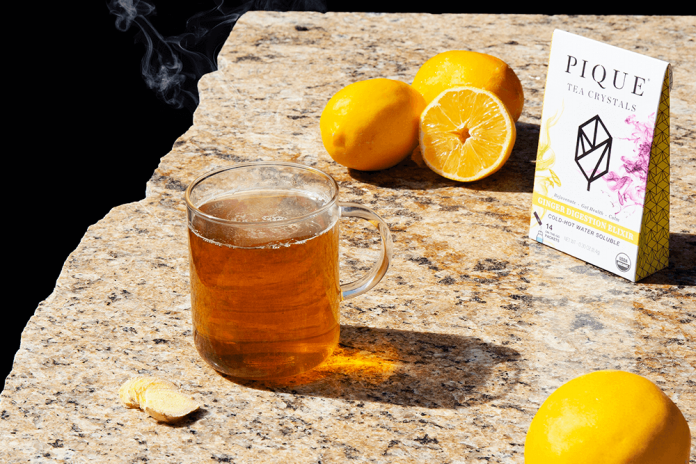- Catching a cold or feeling the “winter blues” may be a sign that you have too much cold energy in your body, according to Traditional Chinese Medicine.
- The difference between temperature and essence is key in supporting energy balance and staying healthy during the winter season.
- We can use TCM to support warmth and balance in the body by eating warming foods, supporting the kidneys, and more.
If you’ve ever felt unusually tired, anxious, sad, or just blah during the winter season, you certainly aren’t alone. The “winter blues” have affected most of us at some point or another.
When the winter chill sets in and the days become shorter and darker, it can have a real impact on our health. Our energy levels might drop, we might feel “blue” without knowing why, and many of us come down with the flu, a common cold, or a stomach bug. There’s a reason this time of year is also called “cold and flu season,” right?
According to Traditional Chinese Medicine (TCM), part of the reason for this could be due to an imbalance in our internal energy, or qi. In TCM many illnesses are correlated with having too much cold energy in the body.
Temperature vs. Essence
Having too much cold in the body doesn’t actually mean that your body temperature has changed. Wait – what?
You see, “coldness” in TCM is more than temperature, it also refers to an essence or energy.
Something can be warm in temperature but cold in essence, and vice versa. So, your body temperature might remain stable at 98.6 °F throughout the winter, but that doesn’t mean your internal energy hasn’t become colder.
During the winter months, when nature becomes extremely cold, it can be very easy to accumulate too much cold essence within the body, making yourself more susceptible to developing the “winter blues” and other illnesses.
Here are some TCM-based tips for creating warmth and supporting balanced energy during the winter season.
5 Ways to Stay Balanced During Winter
1. Slow down.
In nature, everything slows down in the winter. The trees drop their leaves. The animals hunker down and hibernate. In the natural world, winter is the season to rest and to conserve and rebuild energy for the spring.
But, for us humans, the winter season often feels like the busiest time of year! Most of us exert more energy and get less rest. We add holiday shopping, parties, family obligations, and vacations to our already jam-packed schedules.
Here are some ways to slow down this winter so that your body can conserve and restore its energy levels:
- Commit to a mindfulness practice like qigong or meditation.
- Observe nature. Sit in peaceful reflection and try to match your breath and energy to the calm, quiet that surrounds you.
- Get enough sleep. This is important year-round, but especially so during the winter months.
- Adjust your exercise routine. Regular exercise is one of the foundations of healthy living, but it is important to listen to your body and respect your energy levels. Perhaps your exercise routine is too rigorous for the restful nature of winter and you might benefit from a more restorative physical activity like yoga or walking.

2. Support your kidneys.
In TCM, the kidney is the dominant organ in the winter season. It is considered the body’s energy powerhouse, storing reserve qi and supplying it to other organs when they are low.
When your kidneys are out of balance, you might not feel quite like yourself. In TCM, physical signs of kidney imbalance might include: urinary issues, lower back pain, knee pain, tinnitus or hearing loss, bone or teeth issues, sexual issues, infertility and hair loss.
Here are 3 ways to nourish your kidney qi during the colder months:
1. Warm Your Ears
Ears are the kidney’s sensory organ, so it is important to keep your ears warm throughout this cold season. Wear earmuffs outside (because they’re so dang adorable!) or a hat/beanie that covers your ears. While inside, place your hands over your ears and rub for about 5 minutes until they’re warm to the touch.
2. Treat your Feet
If you’ve ever had acupuncture, you’re probably familiar with the concept of meridians. These are the pathways of energy that flow throughout the body. The kidney meridian begins in the soles of your feet, so it is good to stimulate these energy points during the winter. You can do this two ways:
- March in Place. Keep your feet flat and stomp heavily in place for 4-5 minutes.
- Acupressure (like a DIY form of acupuncture). The kidney acupressure point, called “yongquan,” is located at the exact center of the bottom of each foot. Using your thumb or a tennis ball, massage this point as deeply as comfortable. It may be sore, but that means you’re hitting the right spot to stimulate kidney qi.
3. Eat Salty Food
According to TCM, the kidney is a water element and is associated with salty taste. Anything that tastes salty or lives in saltwater is said to strengthen kidney energy. Shellfish like shrimp, mussels, clams, or lobster are especially beneficial. Other foods include bone soups/broths, beans, and nuts— especially walnuts. And be sure to drink plenty of water.
3. Eat warming foods.
Most of us know that healthy eating can support the immune system. In the West, we usually assess the health benefits of a food based on its nutrients, like fiber and vitamin content. But in TCM, food is categorized by its essence and how it affects the energy balance in the body.
See, food is divided into five natures, or siqi: cold, cool, neutral, warm, and hot. These have nothing to do with temperature. Green tea, for example, is cooling in nature. So, even though it is often enjoyed as a hot beverage, it has a cooling effect on the body.
During cold weather, we must take extra care to nourish warmth within our bodies to remain in balance. Based on siqi, a healthy diet in the winter might look very different from a healthy diet in the summer.
Foods that have a warming effect on the body include:
- Fruits: coconut, guava (also high in vitamin c which supports healthy immune function [1], apricot, lychee, mandarin, mango, peach, raspberry, Chinese red dates
- Vegetables: onions, leeks, chives, mustard greens, pumpkins, squash, and spring onions
- Nuts, grains, and seeds: Walnuts, pistachios, pine nuts, chestnut, glutinous rice, malt, caraway seed
- Meat, dairy, and seafood: butter, chicken, deer (venison), ham, lamb, eel, mussels, sea cucumber, prawns/shrimp, goat milk
- Spices: black pepper, basil, cinnamon, chili, clove, cumin, coriander, fennel seed, garlic, ginger, ginseng, nutmeg, rosemary, spearmint
- Vinegar, wine, coffee
You may notice that many of these are key ingredients in those cold weather “comfort foods” we love so much. Coincidence?? Not likely.
Of course, many of us also love to warm up in the winter with hot beverages. Luckily, there are many teas that have a warming effect on the body as well.
Drink these teas to help your body stay in balance during wintertime:
- Black tea is completely oxidized, which makes it the most warming of all the “true” teas (those made from the leaves of the camellia sinensis, or tea plant). English Breakfast, Earl Grey, Pu’er, Masala Chai, and other varieties of black tea are perfect for creating heat deep within your core.
- Oolong tea. Go for a highly oxidized version (at least 60%) for the most warmth.
- Herbal teas made from warming herbs and spices, like ginger, turmeric, and cinnamon. Cinnamon bark is also used in TCM to warm and strengthen the kidney— a two-for-one spice during the colder months!
Ever wonder why you crave chai tea this time of year?? Probably because this beloved spiced tea combines the most warming spices with the most warming tea, making it the ultimate warming winter brew. The body knows best!

4. Dress for the season (not necessarily the weather).
Every winter seems to have a few of those unseasonably warm days. And who’s complaining?!
But don’t pull out the spring wear from the back of your closest just yet! According to TCM, even if the temperature reaches 60 degrees, the essence follows the season. And the essence of winter is cold.
This cold essence is what the body reacts to. So, wearing lightweight shirts, t-shirts, or sandals during winter causes your body to use extra qi which can make you more susceptible to illness or the “winter blues”.
Wear winter clothing all season to preserve qi and to allow your body to continue its winter rest.
5. Chase the sun and play in the snow.
Ever notice how your dog or cat loves to lay in that beam of sunlight that shines through the window?
The sun is the ultimate source of warmth. Sunbathing is a powerful way to warm your body and support balance during wintertime. Try curling up next to your dog, I’m sure he won’t mind sharing his sunbeam. Your cat might protest a little though…
You can also soak up the sun’s rays (and get that important vitamin D!) by bundling up and getting outside: enjoy brisk walk with the sun on your face, try some fun winter activities like ice skating or snowshoeing, or sit outside on a sunny porch and sip a cup of warming black tea.
Also, don’t be afraid to reconnect with your inner child and play in the snow during the winter season! In ancient China, great attention was paid to the transformative energy of snow. It is considered to be water from heaven and represents transformation and renewal.

Final Thoughts
When nature becomes cold during the winter it can be easy to deplete our energy reserves and accumulate too much cold essence within the body. According to Traditional Chinese Medicine, this can make us susceptible to developing the “winter blues” or other illnesses.
To help you stay healthy during the winter, you might want to try balancing your body by slowing down, eating warming foods, dressing in winter attire, and soaking up the sun’s rays. TCM also tells us it is especially important to support the kidneys during winter since they store our reserve energy.






